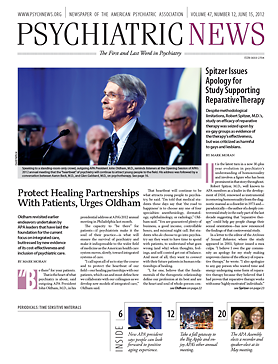APA’s annual Institute on Psychiatric Services (IPS) provides an ideal opportunity for psychiatrists and other mental health professionals to study an array of clinical innovations and services while satisfying continuing medical education or maintenance of certification (MOC) requirements.
This year’s IPS, the theme of which is “Pursuing Wellness Through Recovery and Integration,” will be held in New York City from October 4 through 7.
Particularly timely topics slated for discussion at the IPS include the use of buprenorphine to treat opioid dependence; working with homeless individuals in clinical settings; finding employment in the psychiatric field; improving primary care providers’ understanding of psychopharmacology; and the practice of emergency, geriatric, and culturally sensitive psychiatry.
The 64th IPS will also feature two special sessions highlighting the legacy of community-based health movements in the United States.
Pioneering psychiatrists Leonard Stein, M.D., Joel Feiner, M.D., and Matthew Dumont, M.D., will present an overview of the first 50 years of the community health era. And Jack Geiger, M.D., the leading player in the creation of community health centers, will speak about the relationship between community health and mental health, the effective application of public-health methodology in improving the lives of those with the greatest needs, the impact of poverty on public health, and how health care organizations can work to support community resilience and cohesion. Geiger is a founder and past president of Physicians for Human Rights and Physicians for Social Responsibility. In 1998 he received the Institute of Medicine’s Gustav O. Lienhard Award for “creating a model of the contemporary community health center to serve the poor and disadvantaged and for contributions to the advancement of minority health.”
In addition, multiple IPS sessions will focus on the conference’s twin themes of integrated care and mental health recovery.
An expanded track on the topic of strengthening the relationship between mental health and primary care providers will present multiple opportunities for physicians and other clinicians from a variety of disciplines to talk to and learn from each other about how best to collaborate.
Recovery-focused conference sessions will explore the role of psychiatrists in achieving lasting improvements and will include the perspective of individuals who have received psychiatric treatment.
One of those individuals, mental health care recipient and prominent advocate Elyn Saks, will deliver the keynote address at the institute’s Opening Session.
Other prominent clinicians on the program include Judith Beck, Ph.D., president of the Beck Institute for Cognitive Behavior Therapy, who will discuss her therapeutic approach; Joseph Parks, M.D., director of the Missouri Institute of Mental Health, who will speak about “health homes” based in community mental health settings; and Daniel Carlat, M.D., director of the Pew Prescription Project, who will discuss topics pertinent to psychopharmacology.
Additionally, Jurgen Unutzer, M.D., M.P.H., a professor and vice chair of psychiatry at the University of Washington, will speak about integrated care, a concept in which interest is rapidly growing, while Ronald Diamond, M.D., a professor of psychiatry at the University of Wisconsin, will discuss recovery-oriented psychopharmacology.
Key policy issues in mental health care will also be on the agenda. Experts scheduled to address these issues include National Council President and CEO Linda Rosenberg, M.S.W.; Harvard health economist Thomas McGuire, Ph.D.; British social epidemiologist Richard Wilkinson; New York State Mental Health Commissioner Michael Hogan; Carter Center Mental Health Program Director Thomas Bornemann, Ed.D.; and former APA presidents Paul Appelbaum, M.D., and Pedro Ruiz, M.D.


